- Home
- Lisa Gardner
Love You More Page 20
Love You More Read online
Page 20
Prison is a social place.
The Suffolk County Jail involves multiple buildings. Sadly, only males in the lower floors of the tower could communicate via the toilets with the females on the top three levels. Obviously, this posed a great hardship for the men in other buildings.
The enterprising males in Building 3, however, figured out that we could peer down at their windows from our cells. As Erica explained to me, first thing in the morning our job was to check for messages posted in the windows of Building 3-say, an artful arrangement of socks, underwear, and T-shirts forming a series of numbers or letters. Only so much could be spelled out with socks, obviously, so a code had been developed. We would write down the code, which would direct the women of 1-9-2 to various books during library time, where a more complete message could be recovered (fuck me, fuck me, do me, do me, oh you’re so pretty can you feel me get so hard…).
Prison poetry, Erica told me with a sigh. Spelling wasn’t her strong suit, she confessed, but she always did her best to write back, leaving behind a fresh note (yes, yes, YES!) in the same novel.
In other words, inmates could communicate between units, female pretrial detainees to males in general pop and vice versa. Most likely, then, the entire prison population knew of my presence, and an inexperienced detainee in one unit could gain assistance from a more hardened inmate from another.
I wondered how it would happen.
Say, when my entire unit was escorted down nine floors to the lower-level library. Or the couple of times we’d go to the gym. Or during visitation, which was also a group activity, one huge room filled with a dozen tables where everyone intermingled.
Easy enough for a fellow inmate to saddle up beside me, drive a shiv through my ribs, and disappear.
Accidents happen, right? Especially in prison.
I did my best to think it through. If it were me, a female detainee trying to get at a trained police officer, how would I do it? On second thought, maybe not overt violence. One, a cop should be able to fend off an attack. Two, the few times the unit was on the move-walking to the library or the gym or visitation-we were escorted by the SERT team, a bunch of hulking COs prepared to pounce at a moment’s notice.
No, if it were me, I’d go with poison.
Time-honored female weapon of choice. Not hard to smuggle in. Each detainee was allowed to spend fifty bucks a week at the canteen. Most seemed to blow their wad on Ramen noodles, tennis shoes, and toiletries. With outside help, no problem stashing a little rat poison in the seasoning packet of the Ramen noodles, the cap of the newly purchased hand lotion, etc., etc.
A moment’s distraction and Erica could stir it into my dinner. Or later, out in the commons area when another detainee, Sheera, offered me peanut butter on toast.
Arsenic could be combined into lotions, hair products, toothpaste. Every time I moisturized my skin, washed my hair, brushed my teeth…
Is this how you go crazy? Realizing all the ways you could die?
And if you did, how few people would care?
Eight twenty-three p.m. Sitting alone on a thin mattress in front of a thickly barred window. Sun long gone. Gazing out at the frigid darkness beyond the glass, while behind me, the relentless fluorescent lights burned too bright.
And wishing for just an instant that I could bend back those bars, open up the high window and, nine stories above the churning city of Boston, step out into the brisk March night and see if I could fly.
Let it all go. Fall into the darkness there.
I pressed my hand against the glass. Stared into the deep dark night. And wondered if somewhere Sophie was gazing out at the same darkness. If she could feel me trying to reach her. If she knew that I was still here and that I loved her and I was going to find her. She was my Sophie and I would save her, just as I had done when she’d locked herself in the trunk.
But first, we both had to be brave.
Brian had to die. That’s what the man had told me, Saturday morning in my kitchen. Brian had been a very bad boy and he had to die. But Sophie and I might live. I just had to do as I was told.
They had Sophie. To get her back, I would take the blame for killing my husband. They even had a few ideas on the subject. I could set things up, argue self-defense. Brian would still be dead, but I’d get off and Sophie would be miraculously found and returned to me. I’d probably have to quit the force, but hey, I’d have my daughter.
Standing in the middle of the kitchen, my ears ringing from gunfire, my nostrils still flared with the scent of gunpowder and blood, this had seemed a good deal. I’d said yes, to anything, to everything.
I’d just wanted Sophie.
“Please,” I’d begged, begged in my own home. “Don’t hurt my daughter. I’ll do it. Just keep her safe.”
Now, of course, I was starting to realize how foolish I’d been. Brian had to die and someone else take the blame for his death? If Brian had to die, why not tamper with his brakes, or cause an “accident” next time he went skiing? Brian was alone most of the time, plenty of things the man in black could’ve done other than shoot Brian and order his wife to take the blame. Why that? Why me?
Sophie would be miraculously found? How? Wandering in a major department store, or maybe waking up at a highway rest stop? Obviously the police would question her, and children were notoriously unreliable witnesses. Maybe the man could scare her into saying nothing, but why take that risk?
Not to mention once my daughter was returned to me, what incentive did I have to stay quiet? Maybe I’d go to the police then. Why take that risk?
I was thinking more and more that the kind of person who could shoot a man three times in cold blood probably didn’t take unnecessary risks.
I was thinking more and more that the kind of person who could shoot a man three times in cold blood had a lot more going on than he was admitting.
What had Brian done? Why did he need to die?
And did he realize, in the last second of his life, that he’d almost certainly doomed me and Sophie, as well?
I felt the metal bars press against either side of my hand, not round as I’d assumed, but fashioned in a shape similar to the slats in vertical blinds.
The man wanted me in prison, I realized now. He, and the people he no doubt worked for, wanted me out of the way.
For the first time in three days, I smiled.
Turned out, they had a little surprise coming. Because in the bloody aftermath, my ears still ringing, my eyes wide with horror, I’d latched onto one thought. I needed to buy time, I needed to slow things down.
Fifty thousand dollars, I’d offered the man who’d just killed my husband. Fifty thousand dollars if he’d give me twenty-four hours to “get my affairs in order.” If I was going to take the blame for my husband’s death, end up in jail, I had to make arrangements for my daughter. That’s what I’d told him.
And maybe he didn’t trust me, and maybe he had been suspicious, but fifty grand was fifty grand, and once I explained to him that I could put Brian’s body on ice…
He’d been impressed. Not shocked. Impressed. A woman who could preserve her husband’s body with snow was apparently his kind of gal.
So the nameless hit man had accepted fifty grand, and in return I had twenty-four hours to “get my story straight.”
Turns out, there’s a lot you can do in twenty-four hours. Especially when you’re the kind of woman who can dispassionately shovel snow over the man who’d once promised to love her, to take care of her, to never leave her.
I didn’t think of Brian now. I wasn’t ready, couldn’t afford to go to that place. So I focused on what mattered most.
Who do you love?
The hit man was right. That’s what life comes down to in the end. Who do you love?
Sophie. Somewhere out there in that same darkness, my daughter. Six years old, heart-shaped face, big blue eyes, and a toothless smile that could power the sun. Sophie.
Brian had died for her. Now I would survive
for her.
Anything to get my daughter back.
“I’m coming,” I whispered. “Be brave, sweetheart. Be brave.”
“What?” Erica said, from the top bunk where she was mindlessly flipping cards.
“Nothing.”
“Window won’t break,” she stated. “No escaping that way!” Erica cackled as if she’d told a great joke.
I turned toward my roommate. “Erica, the pay phone in the commons area-can I use that to make a call?”
She stopped playing her cards.
“Who you gonna call?” she asked with interest.
“Ghostbusters,” I said, straight-faced.
Erica cackled again. Then she told me what I needed to know.
24
Bobby wanted to stop for dinner. D.D. did not.
“You need to take better care of yourself,” Bobby informed her.
“And you need to stop fussing over me!” she snapped back, as they drove through the streets of Boston. “I never liked it before and I don’t like it now.”
“No.”
“Excuse me?”
“I said no. And you can’t make me.”
D.D. twisted in the passenger’s seat until she could glare straight at him. “You do realize pregnant women are expected to be hormonal and crazy. Meaning I could kill you now, and as long as there’s one mother on the jury, I’d get away with it.”
Bobby smiled. “Ahh, Annabelle used to say the same thing!”
“Oh, for Pete’s sake-”
“You’re pregnant,” he interrupted her. “Men like to fuss over pregnant women. It gives us something to do. We also, secretly, love to fuss over babies. Why, the first time you bring in the infant to meet your squad… I bet Phil will knit a pair of booties. Neil… I’m guessing he’ll provide Looney Tunes Band-Aids and the baby’s first bike helmet.”
D.D. stared at him. She hadn’t thought of booties, Band-Aids, or bringing the kid to work. She was still working on baby, let alone Life with Baby.
She had a text from Alex: Heard about the arrest, how goes the rest of the battle?
She hadn’t answered. She didn’t know what to say. Sure, they’d arrested Tessa Leoni, but they’d also failed to find six-year-old Sophie. And the sun had gone down for the second time, now thirty-six hours since the initial Amber Alert, but probably two full days since Sophie had gone missing. Except, most likely the Amber Alert didn’t matter. Most likely Tessa Leoni had killed her entire family, including Sophie.
D.D. wasn’t working a missing persons case; she was leading a murder investigation to recover a child’s body.
She wasn’t ready to think about that yet. Not prepared for Alex’s gentle, but always probing questions. Nor did she know how to segue from that conversation to Oh yes, and I’m pregnant, which you haven’t heard yet, but Bobby Dodge knows all about, having been informed by a female murder suspect.
These were exactly the kind of situations that made D.D. a workaholic. Because finding Sophie and nailing Tessa would make her feel better. While talking to Alex about the new world order would only be falling deeper and deeper down the rabbit’s hole.
“What you need is a falafel,” Bobby said now.
“Gesundheit,” D.D. answered.
“Annabelle loved them when she was pregnant. It’s meat, isn’t it? You can’t stand the smell of meat.”
D.D. nodded. “Eggs don’t do wonders for me either.”
“Hence, Mediterranean food, with its many and varied vegetarian dishes.”
“Do you like falafels?” D.D. asked suspiciously.
“No, I like Big Macs, but that’s probably not going to work for you right now-”
D.D. shook her head.
“So falafels it is.”
Bobby knew a place. Apparently a favorite of Annabelle’s. He went inside to order, D.D. stayed in the car to avoid kitchen odors and catch up on voice mail. She started by returning Phil’s call, asking him to rerun Brian Darby’s financials, while digging deeper for other accounts or transactions, possibly under a family name or an alias. If Darby had a gambling habit, they should be able to see its impact on his bank account, with large sums of money coming and going, or perhaps a series of cash withdrawals from ATMs at Foxwoods, Mohegan Sun, or other casinos.
Then she transferred to Neil, who’d been working the hospital beat. Neil had been asking about Tessa’s medical history. Now D.D. wanted to know about Brian’s. In the past twelve months, any incidents of broken kneecaps (maybe a ski injury, D.D. mused)-or, say, a fall down a long flight of stairs. Neil was intrigued, saying he’d start right on it.
The hotline was receiving fewer Sophie sightings, but more calls concerning the white Denali. Turned out the city was filled with white SUVs, meaning the taskforce needed additional manpower to chase down all leads. D.D. suggested that the hotline squad pass all vehicle sightings to the three-man team currently tracing the truck’s final hours. Which, she informed them, should be working 24/7, all OT requests automatically approved and if they needed more bodies, then snag more officers.
Tracking down the final drive of Brian Darby’s SUV was a clear priority-pinpoint where the Denali had gone Saturday afternoon, find Sophie’s body.
The thought depressed D.D. She ended her calls and stared out the window instead.
Chilly night. Pedestrians hustled by on the sidewalk, collars turned up tight around their ears, gloved hands thrust deep into coat pockets. No snow yet, but it felt like it was coming. A cold raw night, which fit D.D.’s mood.
She didn’t feel good about arresting Tessa Leoni. She wanted to. The female trooper bothered her. Both too young and too composed. Too pretty and too vulnerable. All bad combinations in D.D.’s mind.
Tessa was lying to them. About her husband, her daughter, and if Hamilton’s theory was correct, about two hundred and fifty thousand dollars currently missing from the troopers’ union. Had Tessa stolen the money? Was this part of her “new life”? Steal a quarter of a million, eliminate the family, and ride off into the sunset, young, pretty, and rich?
Or did it come back to the husband? Had he accrued gambling debts no honest man could pay? Maybe embezzling state police monies was his idea and she’d been pressured into going along. Stand behind your man. Except then, once she had the cash, realized the full risk she’d taken, and considered the lure of total freedom… Why hand over the ill-gotten gains if you could keep them all for yourself?
She’d had a pretty good plan, too. Set up her husband as a child murderer and wife beater. Then off him in self-defense. Once the dust settled, Tessa could quietly resign from the police and move to another state, where she could be a widow who’d inherited two hundred and fifty thousand in life insurance.
Plan would’ve worked, D.D. thought, if the ME hadn’t noticed the cellular damage caused by freezing.
Maybe that’s why Tessa had been putting pressure on Ben to release her husband’s body. To try to avoid the autopsy altogether, or if it did happen, for it to be rushed. Ben would get in, out, done, and nobody would be the wiser.
Way to go, Ben, D.D. thought, then realized she was exhausted. She hadn’t eaten today, she hadn’t slept much last night. Her body was shutting down on her. She needed a nap. She needed to call Alex.
Dear God, what was she ever going to say to Alex?
Car door popped open. Bobby climbed in. He was holding a brown paper bag that wafted all sorts of curious scents. D.D. inhaled, and for once, her stomach didn’t rebel. She breathed in deeper, and just like that, she was starving.
“Falafel!” she ordered.
Bobby patted her hand, already digging out the wrap. “Now, who was saying men shouldn’t fuss…”
“Gimme, gimme, gimme!”
“Love you, too, D.D. Love you, too.”
– -
They ate. Food was good. Food was energy. Food was power.
When they were done, D.D. demurely wiped her mouth, cleaned her hands, and returned the trash to the brown paper
bag.
“I have a plan,” she said.
“Does it involve me going home to my wife and baby?”
“No. It involves going to Trooper Lyons’s house, and questioning him in front of his wife and children.”
“I’m in.”
She patted his hand. “Love you, too, Bobby. Love you, too.”
Lyons lived in a modest 1950s raised ranch, seven blocks over from Brian Darby. From the street, the house appeared dated but well maintained. Tiny front yard, currently cluttered with a collection of plastic snow shovels and sleek sleds. The remains of a snowman and what appeared to be a snow fort lined the driveway, where Lyons’s cruiser was parked at attention.
Bobby had to circle the block a couple of times for parking. When no spots became available, he parked illegally behind Lyons’s cruiser. What was the point of being a cop if you couldn’t bend a few rules?
By the time D.D. and Bobby got out of the car, Lyons was standing on the front porch. The burly trooper wore faded jeans, a heavy flannel shirt, and an unwelcoming scowl.
“What?” he asked by way of greeting.
“Got a couple of questions,” D.D. said.
“Not at my house you don’t.”
D.D. eased back, let Bobby take the lead. He was a fellow state officer, not to mention better at playing good cop.
“Not intruding,” Bobby said immediately, tone placating. “We were at the Darby house,” he lied, “thought of a couple of things, and since you’re right around the corner…”
“I don’t bring work home.” Lyons’s ruddy face was still guarded, but not as hostile. “I got three kids. They don’t need to be hearing about Sophie. They’re freaked out enough as it is.”
“They know she’s missing,” D.D. spoke up. He shot her a look.
“Heard it on the radio when their mother was driving them to school. Amber Alerts.” He shrugged his massive shoulders. “Can’t avoid ’em. Guess that’s the whole point. But they know Sophie. They don’t understand what could’ve happened to her.” His voice grew rougher. “They don’t understand why their father, the super-cop, hasn’t brought her home yet.”

 Find Her
Find Her Before She Disappeared
Before She Disappeared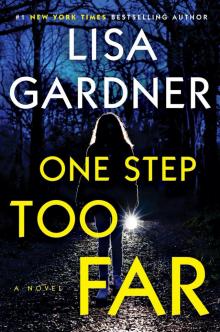 One Step Too Far
One Step Too Far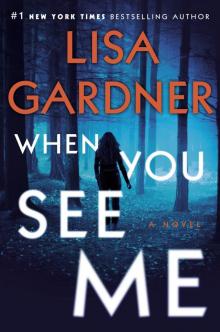 When You See Me
When You See Me Never Tell
Never Tell Touch & Go
Touch & Go The Survivors Club
The Survivors Club MacNamara's Woman
MacNamara's Woman Love You More: A Novel
Love You More: A Novel Gone
Gone The Perfect Husband
The Perfect Husband Maggie's Man: A Family Secrets
Maggie's Man: A Family Secrets The 7th Month
The 7th Month The Neighbor
The Neighbor Hide
Hide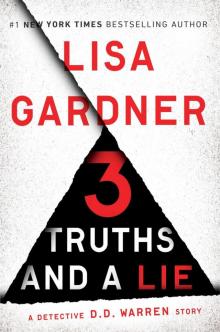 3 Truths and a Lie
3 Truths and a Lie Catch Me
Catch Me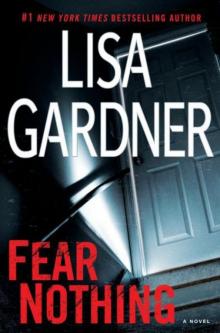 Fear Nothing: A Detective
Fear Nothing: A Detective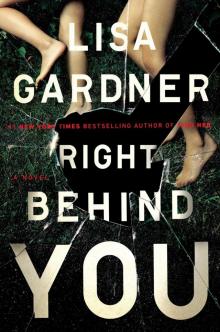 Right Behind You
Right Behind You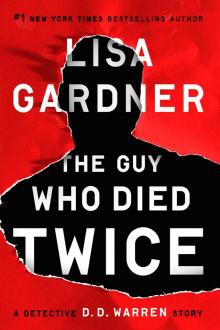 The Guy Who Died Twice
The Guy Who Died Twice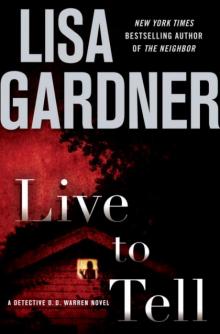 Live to Tell: A Detective D.D. Warren Novel
Live to Tell: A Detective D.D. Warren Novel Live to Tell
Live to Tell Maggie's Man: A Family Secrets Novel
Maggie's Man: A Family Secrets Novel The Other Daughter
The Other Daughter Alone
Alone Crash & Burn
Crash & Burn The Detective D. D. Warren Series 5-Book Bundle
The Detective D. D. Warren Series 5-Book Bundle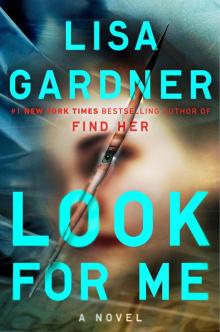 Look for Me
Look for Me Love You More
Love You More The FBI Profiler Series 6-Book Bundle
The FBI Profiler Series 6-Book Bundle The Third Victim (Quincy / Rainie)
The Third Victim (Quincy / Rainie) Say Goodbye
Say Goodbye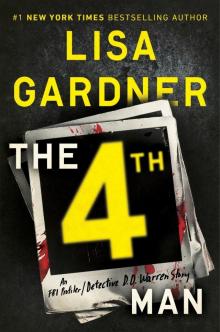 The 4th Man
The 4th Man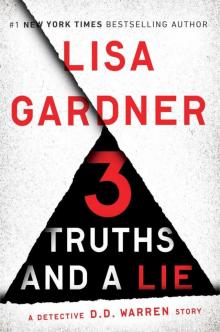 3 Truths and a Lie: A Detective D. D. Warren Story (Kindle Single)
3 Truths and a Lie: A Detective D. D. Warren Story (Kindle Single) Brandon's Bride
Brandon's Bride